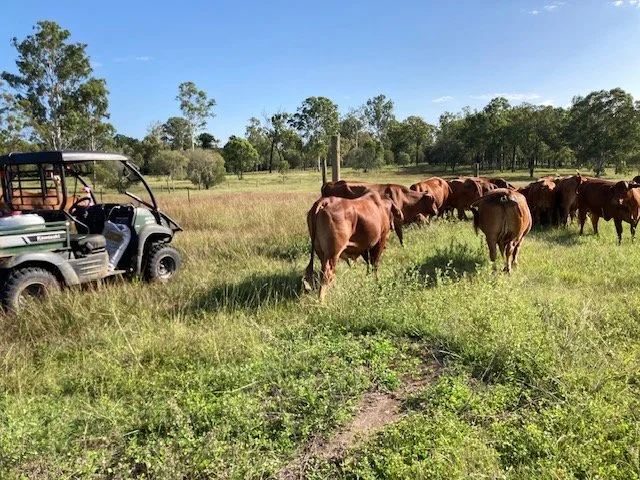DUNCAN Carbon project
The Duncan Carbon Project, located in Colosseum, Queensland, has achieved another major milestone with the issuance of 5,773 Australian Carbon Credit Units (ACCUs), following its first issuance of 481 ACCUs. This makes the Duncan CP one of the first soil carbon projects in Australia to receive a second issuance under the Schedule 2 protocol.
Landholders Lance and Kylie Stephenson, fourth-generation graziers, have transformed their operation through rotational grazing and infrastructure upgrades across 38 paddocks. With support from AgriProve, they introduced fencing upgrades, new water points, reseeding, and digital livestock insights via CERES TAG and AgriProve’s READY GRAZE platform to monitor herd movement and grazing efficiency.
Farm Profile
Enterprise: Grazing enterprise with rotational grazing across 38 paddocks, including 3 biosecurity paddocks (previously 4)
Rainfall: 1200mm Long-term annual average, while the 10-year average has dropped to 900mm
Soil Types: Red loam and clay-loam soils typical of central Queensland
Infrastructure: New fencing, water points, and re-seeded pastures
Stocking Rate: Increased from 20 to 45 DSE/ha
Lance Stephenson: “We’ve got more grass, healthier cattle, and we’re spending less time and money feeding through the dry. The carbon credits have added a new layer of value to what we were already working towards.”
Project Highlights:
5,773 ACCUs issued under the ACCU Scheme, following an initial 481 ACCUs
The first soil carbon projects in Australia with a second ACCU issuance under Schedule 2
Stocking rate lifted from 20 to 45 DSE/ha through rotational grazing and infrastructure upgrades
Results
Between 2021 and 2024, landholders Lance and Kylie Stephenson transitioned from a traditional set-stocking approach across four paddocks to a cell grazing system of 38 paddocks (including 3 biosecurity paddocks), supported by upgraded fencing, new water points, and digital livestock monitoring using CERES TAG integrated with AgriProve’s Herd Insight feature.
These changes have lifted stocking rates from 20 to 45 DSE/ha, improved pasture rest and recovery, and strengthened ground cover across the property. Soil sampling and independent verification confirmed measurable increases in soil carbon, resulting in a total of 6,254 ACCUs issued under the Australian Government’s ACCU Scheme.
Ongoing Practices:
Digital Monitoring: Real-time livestock and grazing data using CERES TAG and READY GRAZE
Infrastructure Investment: New fencing, water points, and reseeded pastures for improved rotation
Biological Inputs: Worm castings, organic distillery by-products, and tailored nutrient brews to build soil biology and resilience
Kylie Stephenson: “Once we saw how much ground cover we were building, it made sense to measure the impact and make carbon a part of the business strategy. The revenue from our first credits is already helping us invest back into the property, from fencing and inputs to pasture trials and herd improvement.”
WHY AGRIPROVE
AgriProve uses data driven tools and unique financing mechanisms to make regenerative grazing accessible and profitable for farmers. Partnering with landholders and industry leaders to mutually benefit from carbon project success. Our unique ACCU success fee model removes the risk and creates a true partnership for the entirety of the project.
Utilising AgriProve’s innovative, digitally enabled Soil Organic Carbon (SOC) model project partners benefit from the expedited soil sampling and carbon crediting process.
““The Duncan Carbon Project is a great example of how productivity and carbon can work together. By refining their grazing system, the Stephensons are improving soil condition, lifting carrying capacity and building climate resilience.”
“At AgriProve, we take a soil-first approach - because when you improve your soil, everything else improves with it. Better soils lead to better pastures, better animals and better long-term business outcomes. The 6,254 ACCUs issued are more than just a credit count. They are a validation of the real, measurable impact Lance and Kylie have made through practical, data-driven management.”
”





